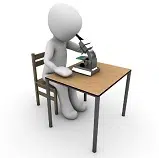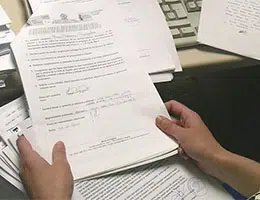 The etymology of examine takes us to the Latin word examināre . The term refers to investigating or analyzing something carefully . For example: “Before allowing people to re-enter the building, engineers will be in charge of examining the structure to determine whether it is safe or not” , “I will examine all the documents and then make a decision” , “The government will “committed to examining the request of rural workers.”
The etymology of examine takes us to the Latin word examināre . The term refers to investigating or analyzing something carefully . For example: “Before allowing people to re-enter the building, engineers will be in charge of examining the structure to determine whether it is safe or not” , “I will examine all the documents and then make a decision” , “The government will “committed to examining the request of rural workers.”
The action of examining is carried out to know details or to know precisely characteristics or qualities. Seeing a car is not the same as examining it: a person sees a vehicle when they detect it with their vision. Examining the car in question, on the other hand, requires observing it carefully, looking at its engine, studying the bodywork, etc. If someone intends to buy a car, they will probably examine it before deciding to purchase.
An exam is a tool that allows you to examine someone's knowledge or condition. A teacher takes a test from a student to evaluate whether he or she has studied and assimilated certain content. A doctor , for his part, can examine a patient who says he feels bad to try to discover what is causing that discomfort.
In many contexts, examining is an act that is essential. An investigator who intends to solve a murder must examine the crime scene to collect evidence that will allow him to find the person responsible, for example. Likewise, a lawyer has to examine the documentation that the victim of a scam brings to him or her to determine what is the best strategy to follow.
 There are several nuances that differentiate the action of examining from looking or observing , among others that may be related depending on the context. As mentioned above, it all starts with the verb see , which we do involuntarily with our eyes whenever we have them open and there is a sufficient light source: we constantly capture images, regardless of whether we understand them or are interested in them. On the other hand, if we want to use our sight voluntarily, the other two actions come into play.
There are several nuances that differentiate the action of examining from looking or observing , among others that may be related depending on the context. As mentioned above, it all starts with the verb see , which we do involuntarily with our eyes whenever we have them open and there is a sufficient light source: we constantly capture images, regardless of whether we understand them or are interested in them. On the other hand, if we want to use our sight voluntarily, the other two actions come into play.
Looking is the first thing that arises after seeing , if we group them according to the degree of knowledge or understanding necessary to do them; For example: we see an object that we don't know or a text that we can't read and we decide to look at it for a few seconds because it catches our attention . However, if we already have some tools to understand it, then it is likely that we will observe it, that is, we will follow it with our eyes for longer and with greater detail.
At the highest point of this scale comes examine , an action that we carry out if we believe we are capable of doing something with its results, for which prior knowledge is necessary. In the previous examples we talk about professionals who examine cases or proposals to decide their action plan, about teachers who test their students to see if they have incorporated the knowledge they have been taught, about businessmen who evaluate the aptitudes of the applicants. to a specific position and of detectives who carefully study the clues of a case to find a logical explanation.
This action is also used in the field of adventure video games, a genre in which it is very important to know in detail the settings and objects that we encounter throughout the story. In these titles, it is common for the main character to be able to perform a series of actions typical of real life, and "examine" is one of the most common, since it is from them that the player can decide his next step.
